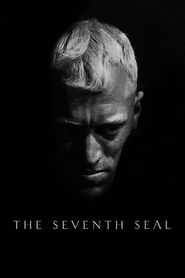
Ingmar Bergman’s thought provoking and philosophical tale, “The Seventh Seal”, is one of the film history’s most famous movies. A film that has been an influence for countless movies ever since (David Lynch and Woody Allen come to mind). It has also been consistently lampooned and satirized (Again Woody Allen).
When I viewed it for the first time, it was well after having seen it’s countless homages and satires. All of those need to be ignored and cast aside to truly appreciate the beauty of the movie.
The film follows a Swedish knight as he returns to his homeland after having fought in the crusades, witnessing bloodshed and terror. The Sweden that he returns to is being enveloped by the horrible black plague that is killing over half of its populace. Once landing on Swedish soil, our knight meets Death, personified by a white figure wearing a black hooded priest’s robe. He goes about playing a game of chess with Death, where the winner takes the soul of not only the knight but of all who will accompany him. If the Knight wins, he retains not only his life but also the meaning of all the suffering he has witnessed. Their game continuous throughout the knight’s journey to his home castle where his wife awaits him.
The crux of the film is whether there is reason in living such a life and is that life worth extending. The knight as played by Max Von Sydow is long strong blond and elegant, personifying the Viking Swedish image that Bergman represents to us. Sydow is wonderful in his portrayal of a suffering, kind and intelligent knight. He is accompanied by his squire, who along with being a fierce fighter himself, is a bitter and sardonic personality who expresses the real human experiences the two go through, while the knight expands on philosophical and spiritual questions.
Their entourage expands as they travel through the plague ravaged land. They meet a traveling comedic acting troupe, who is comprised by an acting manager, and a young family consisting of a man, wife and young son. This family is a form of light within darkness shown in the movie. Their love for each other shines bright. In one scene our knight confesses that he will never forget the moments he is spending with this family as being some of the happiest of his life. The young actor himself is able to see visions of prophets and god. Nobody really believe his visions, feeling that they are an extension of his great imagination. Later in the film we see that he, and only he, can also see Death, as he plays chess with our knight. The actor is named Joseph and his wife Mary, whose names add a religious undertone to their naivety. Joseph’s ability to see Death allows him to save his family which confuses the accepted notion that seeing death means oncoming death is imminent. This also leaves us unaware as to how the film will end. This is one of the countless philosophical questions asked by Bergman in his rich and detailed film.
There are many powerful scenes thrown at the audience throughout the journey. None more powerful than the scene of religious flagellants marching through a town in a procession of self-inflicted pain. We are given a front row seat at their masochistic behaviors’ with a powerful tracking shot that is accompanied by startling sounds of agony. We are also shown a poor teenage girl who is about to be burned to the steak for sleeping with the devil. When the knight asks her if she sees the devil and what he looks like, she responds only that she sees terror. It is clear that Berman is showing us how humankind is shackled by organized religion that has no answers to the horrors of life.
This is a movie that asks the hard question about God and his existence. The answers that are given will not please Rabbis, Priests or any other clerics. I am certain that a post war Europe having gone through the horrors of World War 2, tended to agree with Bergman and the film was a great success.
Today, regardless of all the parodies and imitations, “The Seventh Seal”, is still a relevant and powerful film that incorporates stark realistic images of mediaeval Sweden with a harsh philosophical message of warning. A great move that must be seen

